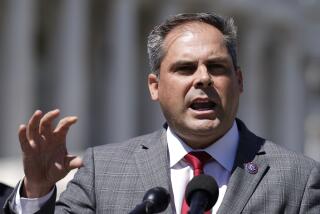Credit Card Budgeting
Like a consumer taking out new credit cards to pay for old debt, the House Republican leadership refuses to restrain its spending and tax-cut frenzy. The latest sign came Tuesday when the House refused to follow the lead of the Senate and narrowly voted down a motion that would insist that tax cuts and spending increases be matched by offsetting tax increases or spending cuts.
In the 1990s, these so-called pay-as-you-go rules ensured that the billions in deficits disappeared. Republican lawmakers, who believed that fiscal discipline was necessary, cooperated with President Clinton to bring the deficit under control. Without such rules, Congress will succumb to long-term fiscal irresponsibility that could end up driving the deficit even higher than the current projected $521 billion for 2005.
Already, pork-barrel spending is reaching a new high. According to Citizens Against Government Waste, which releases its annual “Pig Book” next week, Congress is spending money on a record 10,672 projects this year. Some of the more outlandish projects range from $100,000 to restore a historic Coca-Cola building in Macon, Ga., to $4.3 million for a Geographic Information Center for Excellence at West Virginia University. Oh, and don’t forget $293,000 for hoop barns in Iowa.
No matter how much GOP leaders like to deny it, tax cuts cost the government as well. “When you cut taxes, the economy grows and revenues to the government grow,” declared House Majority Leader Tom DeLay (R-Texas). “I’m not interested in something that would negate our philosophy.” But what about the fact that despite several years of tax cuts, federal revenues are at their lowest ebb since the Depression? Extending tax cuts for the wealthy will only worsen matters, adding at least $1.2 trillion to the deficit over the next 10 years. What’s more, the nonpartisan Congressional Budget Office says the administration’s claims that it will halve the deficit in the next five years are wrong.
To posture as fiscally tough, the administration is pushing so-called economizing that will only end up shortchanging Treasury coffers. For example, the IRS Oversight Board says Bush’s proposed budget for the IRS falls $230 million short of ensuring proper enforcement. Last year, the IRS failed to collect almost $16.5 billion in delinquent tax accounts and investigated only 18% of tax shelters its agents discovered. In addition, Bush is denying an IRS request for 80 more agents to pursue the finances of terrorist organizations like Al Qaeda.
With the House and Senate negotiating on the budget, the stances of moderate Republicans of Maine, Sens. Olympia J. Snowe and Susan Collins, are critical. The Bush tax cuts cannot become permanent if Snowe and Collins hold fast to their support of “pay as you go” rules. Then Washington budgeting could become responsible again. And then maybe there would even be enough money left over for Congress to fully fund IRS efforts to track Al Qaeda.
More to Read
Get the L.A. Times Politics newsletter
Deeply reported insights into legislation, politics and policy from Sacramento, Washington and beyond. In your inbox three times per week.
You may occasionally receive promotional content from the Los Angeles Times.










